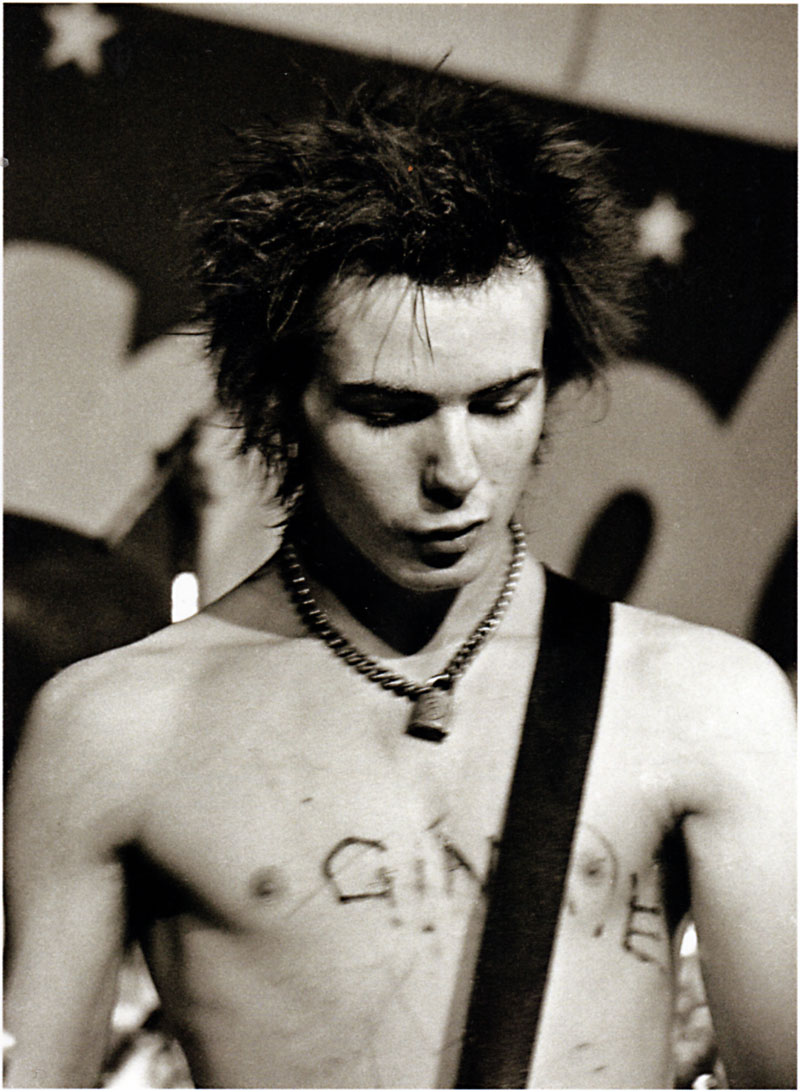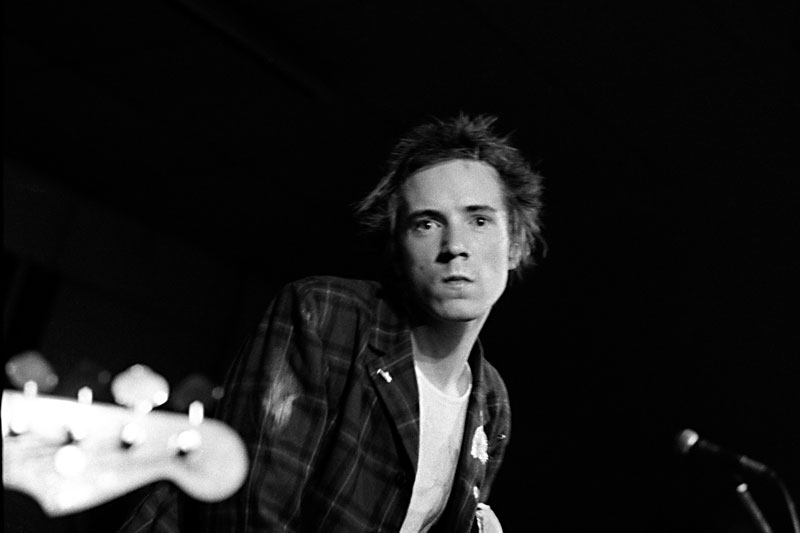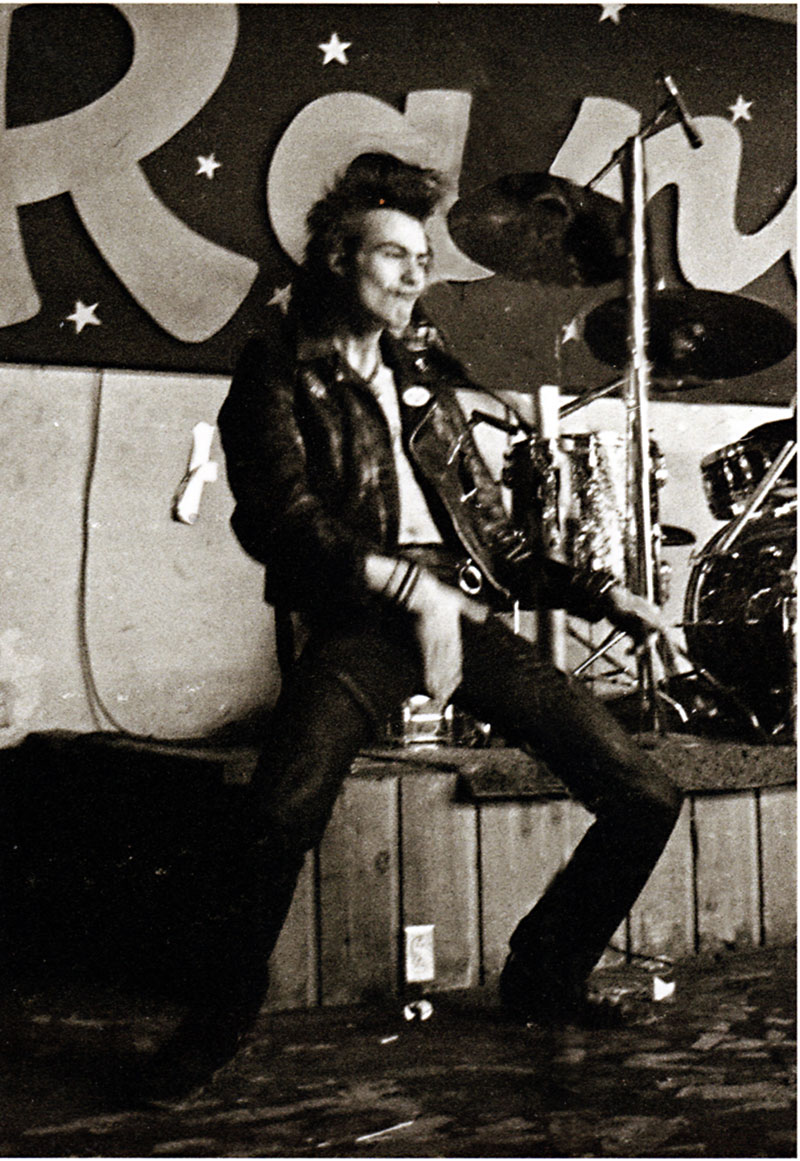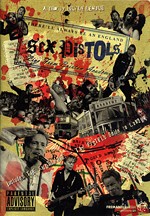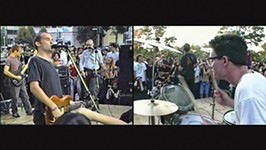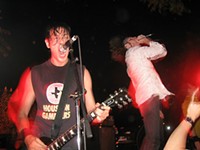This Changes Everything: Austin Witnesses to Sex Pistols' Chaotic Randy's Rodeo Show Go Home and Start Bands
UK instigators blow the roof off San Antonio dance hall in Chapter 4, Part 2, of the "Austin Punk Chronicles"
By Tim Stegall, Fri., Jan. 7, 2022

Editor’s Note: You often don’t know you’re witnessing history in the moment you’re seeing it, but there’s an undeniable feeling of momentousness when you’ve just attended a crazy, life-altering concert. Chapter 4, Part 2, of the “Austin Punk Chronicles” zeros in on the Sex Pistols performance at Randy’s Rodeo in San Antonio, 44 years ago this week, and the immediate aftershocks it sent through the local scene. You can read six previous installments of veteran journalist Tim Stegall’s punk history project here.
I Don’t Want a Holiday in the Sun
7pm, Jan. 3, 1978: Pan Am Flight No. 1 arrived from London at John F. Kennedy International Airport in Queens, N.Y., depositing the four Sex Pistols and their English road manager John Tiberi, aka Boogie. Manager Malcolm McLaren remained in London, planning to fly into San Antonio on Jan. 8. Tour manager Noel Monk, his crew of Vietnam-trained security, and a corps of Port Authority police officers hustled the second English punk band to play America (beat by the Damned in 1977) past 60 photographers and reporters for everyone from The New York Times to High Times. They wanted the Pistols living up to their hype of being rock's most outrageously offensive act. Monk, mindful of Warner Bros. Records' concerns, determinedly defused that bomb before it got lit. The press was kept at several arms' lengths.
Guitarist Steve Jones and drummer Paul Cook mugged for the cameras. Frontman Johnny Rotten, resplendent in a green tartan suit commissioned from (mis)manager Malcolm McLaren's designer partner Vivienne Westwood, scowled at the press. Bassist Sid Vicious sneered and shot the finger, in filthy black jeans and ratty "God Save the Queen" T-shirt, bearing the image of HRH Elizabeth II with safety-pin-festooned lips. Monk hustled them into a van, circled JFK three times, lost the press, then deposited them at Delta's terminal for a flight to tomorrow's opening date in Atlanta.
America looked on, horrified, as the Pistols' tour bus crept across the South. Well, at least the American media was horrified. The Today Show sent veteran NBC reporter Jack Perkins to interview Vicious and Cook at a suite in a posh downtown Atlanta hotel – not the Squire Inn on the edge of town housing the touring party.
"That was the biggest bunch of bullshit ever," says Warner Bros. Director of Publicity Bob Merlis. "I was on the other side of the camera, and they gave him a hard time, as they would do. Jack just did not know how to roll with the punches. What a tightass!"
Vicious demanded five bucks to be interviewed. Perkins balked, brandishing his journalistic integrity.
"He bailed out of the interview because he wouldn't pay them, it was so silly," roars Merlis. "'Let's show the devastation of the hotel room!' So there's a rumpled bedspread and an ashtray with butts in it – that's it!"
The rhythm section overturned a wastebasket and shuffled out. The following morning, as America poured coffee and cooked eggs and toast, Today co-hosts Jane Pauley and Tom Brokaw tut-tutted about how those nice Beatles never acted like this. Come 5pm, America's most trusted news anchor Walter Cronkite looked like he vomited in his mouth every time he pronounced the band's name.
In Atlanta and Memphis, the Pistols' tour bus was greeted by local vice squads and reporters, all chomping at the bit. They expected the grossest shock-rock band in history, like Alice Cooper or Kiss crossed with a snuff film or coprophagic porn. What they got was bone-crunching rock & roll designed to destroy the social order, and Rotten's brand of anti-entertainment: "I'm not here for your amusement," he deadpanned in Memphis, after opening number "God Save the Queen." "You're here for mine."
Monk's security force weaned a severely detoxifying Vicious from heroin with large doses of peppermint schnapps, as he avoided bathtubs and soap like a nice, warm cup of bubonic plague. He nursed his separation anxiety from a toxic relationship with girlfriend Nancy Spungen back home in London with lovely bouts of self-laceration. John Lydon never dropped his Johnny Rotten persona offstage, insulting bandmates, crew, and anyone in his radius from behind a cloud of marijuana smoke, commandeering the tour bus' stereo with his reggae cassettes. Meanwhile, High Times publisher and Sixties radical Tom Forçade whipped up insane paranoia levels within the touring party by sneaking small-time film director Lech Kowalski's skeleton crew into the shows, lensing the guerrilla documentary D.O.A.
"I think the only time we stopped on the tour was at Graceland," recalls John Lydon 40 years later. "And it was closed that day. Maybe they knew we were coming? Only me and Sid were interested in that, and me not so much."
Texas cowered in anticipation of the Pistols' arrival. The next destination was San Antonio. But Monk decided they were stopping in Austin first.
I Dared to Ask for Sunshine, and I Got World War Three!
According to Monk's book 12 Days on the Road, Warner Bros. advised the touring party in Memphis that the Pistols were receiving death threats from the Alamo City. "Come on down to our town you fucking godless limeys," one note reportedly snarled. "We'll rip out your fucking lungs and make you wish you'd never left your own fucking country." Whether real or a McLaren tactic to wind up his clients and keep them on their toes, Monk and McLaren's U.S. liaison Rory Johnston took the intimidation seriously. As the now-graffiti-strewn tour bus crossed the Mississippi River into Arkansas, Monk determined they should hightail it to Austin after looking at a road atlas. The Randy's Rodeo gig being two days away, they could spend a day off in Texas' state capitol, then make it to sound check the following afternoon. Around noon on Jan. 7, Monk instructed the bus driver to pull over at a rest stop just outside Waco. He booked rooms via pay phone at the Austin Ramada Inn, located off I-35 near the UT campus.
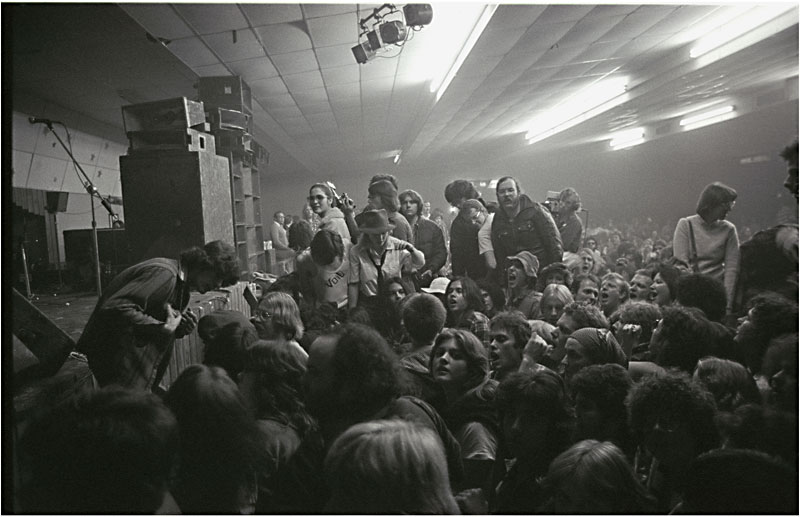
You'd have thought the Visigoths had just stormed the lobby, kicking over the potted plants, spilling tankards of ale, and pissing on the walls when the Pistols appeared four hours later. Bell captain Thornton Arnold reportedly advised Monk that their reservations would be honored, but England's most notorious punk band should be kept away from the other guests. Rotten moaned about the accommodations, grabbing security guard Glen Allison and insisting they walk around Austin. Two blocks later, they entered a movie theater to watch the new Clint Eastwood film, The Gauntlet.
The Austin Sun's Jan. 13, 1978, music news section reported that Jones and Cook, tight friends since they were children, took off with various roadies, "stumbling around town at topless bars, Sixth Street massage parlors, and Esther's Pool Hall." They evidently created quite a commotion, showing up later at a joint called After Ours, catching a set by Little Jimmy & the Bad Boys. Jones reportedly told the Sun's Carlene Brady, "I've been to six bars, and this town sucks." When asked how they'd spent the rest of the day, he replied, "Oh, hanging out on your high street."
Back at the hotel, Monk tended to Vicious' self-inflicted wounds. He'd opened a severe new one on the bus hours earlier, and infection appeared to be setting in. After ministering to the bassist's lacerations with Mercurochrome, peroxide, and bandages, Monk took Vicious out for a walk of their own.
Lydon balks at Monk's report that he took Vicious to see the UT clock tower to view the bullet holes Charles Whitman's sniper rifle left in the sidewalk in 1966.
"That's news to me!" he cackles. "'Allo, you're in Texas! There's bullet holes everywhere! Don't you know the difference? That's what I call 'selective.' Wow! What a crowd-pleaser statement to put in a book!"
What you won't read in Monk's book: "Sid Vicious spent six hours in my house on Shoal Creek the night they came to Austin," says Inner Sanctum Records employee Neil Ruttenberg. "He was totally smacked-out. [NOTE: Actually, that would be peppermint schnapps and Monk's Valium prescription.] They needed a place to put him, and my roommate worked at Record Town. They walked in and said, 'We need to do something with him!' He was out of it, and my roommate said, 'Yeah.' So they brought him over to my house! They put him in a chair, where he sat and drooled for six hours. Then they came and got him."
I’m Looking Over the Wall – And You’re Looking at Me!!!
"Jan. 8, 1978, began like most Central Texas winter mornings: gray, but not terribly cold," Margaret Moser wrote 25 years later. "It was the same in San Antonio – except for the rumbling. The Sex Pistols were coming."
Well, actually they were asleep most of the day. They spent the bulk of the birthday of Elvis Presley and David Bowie blissfully slumbering in their rooms at the Austin Ramada Inn, before boarding their graffiti-strewn coach midafternoon for the 90-minute ride to S.A. It's quite possible several of the cars bounding South on I-35 from Austin for Randy's Rodeo may have either accompanied or passed the tour bus.
Austin Sun Music Editor Bill Bentley went on assignment for Larry Flynt's Los Angeles Free Press, now home for several Sun alumni. Moser and Hoge would meet him down there.
Future Austin Chronicle co-founder and editor Louis Black was a UT Radio-Television-Film major, getting into punk and New Wave via Ruttenberg and Richard Dorsett's proselytizing at Inner Sanctum. Store manager James "Cowboy" Cooper got married that day, and Black left for San Antonio from the wedding reception at Soap Creek. Alvin Crow & the Pleasant Valley Boys were the wedding band. "At a certain point, people started to leave," he told Moser. "An hour and 10 minutes later, a bunch of us ran into each other in the parking lot at Randy's Rodeo."
"The same girl who took me to see the Runaways took me to see the Sex Pistols," says Chris Gates. "But [her car] overheated in San Marcos and we never made it." Perhaps they were passed on that I-35 shoulder by San Marcos bookstore employee Larry Seaman?
The future Standing Wave was unsold on the Pistols, as he read about the burgeoning scene in Creem and New York Rocker.
"I was more into the American bands," he says. "For me, Richard Hell started it all, and Malcolm McLaren took the idea and ran with it back to England."
At the urging of future South by Southwest co-founder Roland Swenson, Seaman trekked to S.A. with Swenson and David Fox. At Randy's, Seaman realized he'd left his ID at home. The doorman stapled a movie theater ticket to each of his jacket lapels, identifying him as a minor.
"So, I couldn't buy beer all night," he chuckles.
Skunks guitarist Eddie Muñoz's VW bus was crammed with Skunks/Violators bassist Jesse Sublett and the rest of the Violators – guitarists Carla Olson and Kathy Valentine, and drummer Marilyn Dean – in back. They scored free tickets after a Stone City promoter tried to trade sex with Dean for an opening slot, and he'd been told to kindly fuck himself. They'd be met at Randy's by Lois Richwine. It was her and Sublett's first date.
Dan Puckett and Phil Tolstead drove from Austin. Fellow future Hun John Burton probably followed Seaman and the Fox brothers from San Marcos. He was attending Texas State University, and had his mom swing by Record Hole to buy six tickets.
Singer/songwriter Steve Earle, who'd graduated high school with Joe Pugliese, was visiting his parents, who lived down the street from Randy's Rodeo. "I walked from my parents' house to see the Sex Pistols," he says. He'd also seen the New York Dolls at Houston's Liberty Hall a few years earlier.
San Antonians Buxf Parrot and Glen Taylor knew each other from age 10. Parrot had relocated to Austin, and attended the gig with his brother and Taylor.
"We had been listening to the Ramones, Sex Pistols, New York Dolls, stuff like that," he says. "We saw they were coming, and it was, 'Aw, hell yeah! We gotta go to that!'"
A 14-year-old San Antonian named Jeff Smith bought tickets. His older-by-a-decade brother Barry, broke and again living at home, played bass with local Sixties British Invasion revivalists the Krayolas. Jeff fronted a band called the Dwarves, which played Pistols and Ramones covers. The Smith brothers bought all the import Pistols singles and devoured the UK rock weeklies. Rotten was Jeff's hero.
Jeff bought tickets for himself and Barry "on the condition that he takes me." He was taken by his older brother, all right. Barry took the tickets and disappeared for two weeks. No word whether the other ticket went to one of his Krayolas bandmates – they attended en masse.
In Kerrville, Brian Faltin, scion of a local ranching family going back three generations, was attending Shriner College. A fan of the Allman Brothers, Cream, and Joe Cocker, he was irritated with this upstart English band loudly insisting that their purpose was to "destroy rock & roll."
"I agree that music in '78 had gotten pretty MOR," he says. "It needed to be shaken up. But the Sex Pistols weren't the shake-up I was looking for."
Hanging out with his friends that afternoon, he decided he would spend the cost of a tank of gas and $7 for tickets to "hassle the Sex Pistols."
"I come from the Sixties generation," he says. "We demonstrated against things we didn't agree with. I felt I had to hold up my end of the bargain."
I Wanna See Some History
"Randy's Rodeo was basically a tin building on a cement slab," says Faltin.
"It is beyond comprehension, just the electricity and the insane air of excitement preceding it," says Burton. "You pull into the parking lot at Randy's, and there are satellite trucks spotted around. There were all kinds of professional film crews and stuff inside. It was packed with all kinds of people."
"There were maybe only 20 punks there," chuckles Parrot. "The rest were all these rednecks wanting to see what the hell this was all about."
"It was not that full," asserts the Krayolas' Hector Saldana. "People were pouring in, but anyone who wanted to get into the show was going to get in. It got filled up, but we weren't packed in there like sardines. But those really excited about the show were crunched in up front."
The Vamps kicked off the festivities.
"Frank took the stage wearing a belt of hot dogs," laughs his brother Joe Pugliese. "He ran a string through a dozen hot dogs and tied it around his waist. So when people would yell or jeer at them, he would take a hot dog and throw it at them."
"The only real interaction I had with any of the Pistols was with Sid," says Frank. "When they pulled up outside, I was sitting in the truck with one of our guitar players. Sid just came over and started talking shit. Then he took the sunglasses off the guy's face and said, 'I'll give these back to ya after the show.' Which he never did."
Next up was Ultra.
"I knew those guys!" scoffs Frank. "I thought, 'What the hell are these guys doin'?' I didn't understand why Ultra was there, but I didn't understand why we were there! 'We shouldn't be doin' this!' We couldn't draw flies when we'd try to get a show."
"Ultra were a heavy metal art band," says Saldana. "They had tall stacks of amps and a huge guitar rack with all these guitars." He adds that the Pistols were as loud as Ultra on minimal, rented equipment: one Ampeg SVT for Vicious, Cook's small rattletrap drum kit, and Jones' Fender Twin Reverb and Music Man combos. This impressed him.
"'Allo, cowboys," Rotten deadpanned shortly after midnight, the crowd exploding as the Pistols walked onto the stage. The singer glared bug-eyed in his green tartan suit, now putrid from days of his sweat and the beer and spit constantly hurled at him. The jacket opened to reveal another of McLaren and Westwood's provocative creations: a T-shirt illustrated with two obviously gay cowboys, pre-Brokeback Mountain, clad in full regalia, minus pants. The heads of their pendulous peckers were a whisker away from touching. He was as spoiling for confrontation as McLaren. Then Jones detonated "God Save the Queen."
"They came out sneering and stuff," says Saldana, three people away from the stage. "And on the very first song, Steve knocked his low E string out of the bridge! And it sounded horrible! And the Pistols were a song-based act. There were clear verse-chorus-bridge structures. So one thing like that was going to sound out of place.
"Johnny Rotten was all hunched over, and right away he went over to Steve and yelled, 'You cunt!' Then Steve figured it out, and they sounded great the rest of the night. It was great rock 'n' roll."
"The band sounded great," says Sublett. "It was raw. Steve and Paul were a helluva rhythm section. The only time it fell apart was when Steve's string went out, first song. It messed Paul up right away. But they got right back on track."
"The Sex Pistols were just wide open," says Bentley. "They were just bashing it out with no real concept, except to be as insulting as humanly possible."
"They were pretty good, for a band without a bass player," says Muñoz "They really didn't sound that all-encompassing. It was probably a poor mix. Steve looked a little disinterested in being there."
"It was fucking 'orrible," Jones recalled to me in 1988. "All them cowboys, and it was raining down garbage all night."
It hailed beer cans and debris from almost the moment their boots hit the boards. The stage rapidly filled with Lone Star cans, hot dogs, coins – you name it. It began to look like a recycling center in front of the amps and drum riser.
"That's fairly typical," chuckles Lydon.
"I heard from people, 'When these guys come, we're just gonna throw shit at 'em!'" says Frank. "I didn't say nothin', I just kept my mouth shut. They were just gonna be stupid."
"It was good to hear the songs halfway live," adds Muñoz. "Sid did everything but play the bass."
Three songs in, Vicious had enough.
"You're all sorry cunts, and we don't like your fucking free gifts!" he screamed, his trademark leather jacket open, revealing "GIMME" scrawled in black marker across his scrawny chest.
"I see we've got a lot of real men out there tonight," taunted Rotten. "You're really fucking tough, you lot. Is this wot makes Texas great? AH-HA-HA-HA!"
"RAWK AND ROLLLL!!!" bellowed one of the -132 IQs in attendance.
Vicious, clearly challenged by Rotten's razor wit, attempted similar audience goading. The best he could come up with? "All you cowboys are f****ts!"
The "fans" were as intelligent as the bassist: "Fuck you!"
"I'll make you wish you never came to Texas, you sonofabitches!"
"There was one of them bucking bronco things," recalls Lydon. "I really wanted to be on that! That was being used as we were singing our songs of love. It was rather impressive, seeing rather large women being thrown around the room!"
"There was no mechanical bull in Randy's at that point in time!" says Joe Pugliese. "There used to be. He's thinking of the Longhorn Ballroom."
"After the other bands played, the frenzy of the crowd just built into this excitement," says Burton. "And when they first came out, it was sheer pandemonium. You had all these people who were yelling stuff, throwing stuff, throwing smashed beer cans or whatever. I think somebody had whipped cream or something."
That was Eddie Muñoz.
"Waitasecond! It wasn't my idea!" he protests. "I was just standing there, minding my own business, waiting for the band to come on, hanging out with my friend Ty Gavin. There's this big tap on my shoulder. It's Tom Wright, and he's got this big overcoat on."
It should be interjected at this point that Tom Wright was a secret instigator behind the scenes of much of the rock & roll we all love. In the mid-Sixties, he was art school roommates with Pete Townshend. He had to go back to his native America suddenly, and left Townshend with a large blues and R&B record collection that formed a chunk of the Who's early repertoire. While road managing the Who stateside in the late Sixties, he was so impressed with the scene at Detroit's Grande Ballroom that he stayed on and became its stage manager, ushering the MC5 and Stooges onstage.
And in 1978, he led the Skunks' guitarist down the path to delinquency ...
"He's pulling out these paper plates and shaving cream, and spraying out these big mounds of shaving cream on the paper," continues Muñoz. "'Hey, c'mon! The second they get onstage, we're gonna pelt Johnny Rotten!' I go, 'What?!' And the band is coming on the stage! 'We gotta go! We gotta go! We gotta do it now! The second he opens his mouth, get him!'
"It's just the kinda crazy thing Tom would do. I just wanted to see the band. But when Tom gets something like that going, you just go along, because you know it's gonna be cool! The guy is just an arbiter of cool."
"Well, what a silly boy!" Lydon chuckles after Muñoz is revealed as the pie thrower. "I could've done with the cake, eaten a slice of that properly. We could have shared it, and traded stories that would have been beneficial to both of us and mankind. We could have talked about his horrible jealousy problem."
“Sid’s Guitar Fell Off ...”
As the third song of the set, "New York" – the Pistols' scathing attack on the home of the world's first punk scene – ground to a halt, something snapped in Faltin. "LET ME AT 'EM!" he screamed, pushing his way through the crowd. "LET ME AT 'EM! C'MON, YOU SONOFABITCH!"
Rotten was visibly bored. "YOU WANNA FUCKIN' FIGHT?!" Faltin continued. "I'LL SHOW YOU A FIGHT!" Rotten turned away and blew his nose, so Faltin turned on Vicious. The bassist charged forward, and Faltin puffed his chest out, thumping it, pantomiming for him to "come on."
"I was just pogoing," scoffs Faltin. "But I was pogoing in a very aggressive manner. I really wanted to cause a stir with Johnny Rotten."
One report had him screaming, "I AM HERE FOR THE EXPRESS PURPOSE OF KILLING JOHNNY ROTTEN!"
"That guy was right near me," says Hoge. "He kept yelling 'fuck you' and holding up the finger at Sid Vicious. They had some serious eye contact going on. I saw him throw a three-quarters-full can of beer at Sid and hit him on the side of the head.
"He saw the guy throw it. That was the difference."
"I just got kinda caught up in the moment," says Faltin. "I caught his attention, and I think I scared him for a little bit."
"CAN'T YOU TAKE A FUCKING BEER CAN, YOU LIMEY BABY?!" Faltin bellowed. "COME AND GET ME, YOU MOTHERFUCKER!"
That was it. Vicious unstrapped his Fender Precision bass, swinging wildly. He missed Faltin. But he hit Warner Bros. Director of Artist Development Ted Cohen – the Pistols' biggest champion at their U.S. label, aside from Bob Regehr – and rock photographer Richard Aaron.
"I was right in front of the stage trying to help [security] out when Sid hit me," says Cohen. "I got hit across the bridge of my nose. Had I or Sid been leaning in one or two inches, it would have been worse. It got the top of my nose and my left eyebrow. Had he come in a little closer, it would have hit the left side of my head. I had bruises on my nose and forehead the next day."
Vicious nearly hit Moser.
"He swung that bass like a scythe," says Hoge. "I was right at the front of the stage. Margaret was behind me, Bill was behind her, and we kinda stepped back."
"Bentley stuck his arm in front of my shoulders and pushed me backward," Moser recalled in 2003. "'Step back, Margaret,' he said. 'This could get ugly.'"
"I tried to take pictures of the melee that ensued," continues Hoge. "All the security people came onstage, and you can see Johnny Rotten standing there, kinda like, 'Huh!'"
"Oh, dear," Rotten deadpanned, as Monk held Vicious back. "Sid's guitar fell off."
"It's funny because I recognized the security guys from the Armadillo," continues Hoge. "They finally wrestled the guy backstage, and the band eventually wandered off."
"I really wasn't there to try and hurt anyone," says Faltin. "There was this story that I had a Bowie knife, and that was not true. They did take me briefly backstage. I was momentarily handcuffed by security. And the assistant manager talked to the cops, they asked what he wanted to do. He didn't want to prosecute, so they let me go.
"I just ended up fanning their flames," Faltin concludes. "I wish I'd stayed home that night and spent my seven bucks on a cheeseburger."
Now I’ve Got a Reason
"I came at the bass player because he knew that I meant physical harm," Faltin told documentary cameras a few months later, in footage used in the Pistols documentaries D.O.A., The Great Rock 'n' Roll Swindle, and The Filth and the Fury. "He knew I meant physical harm, and I have to say I was ugly about it."
"It happens, and it happens right up to today," dismisses Lydon. "You'd think an audience would understand things a little more differently. But no, there'll always be that one – or two, if you're unlucky – that are completely clueless. Just utterly mindless, and I don't know what you're supposed to do about that. But I wouldn't be banning the beer can they're throwing, out of the hundred who are not throwing them."
What's impressive is these events occurred within the show's first 15 minutes. The band was hustled offstage and the lights went off. They reemerged a few minutes later, Rotten asking the crowd as Jones tuned up, "Did you come 'ere to see us, or to see that?" Vicious counted in "EMI," and they lurched back into the performance with relatively little incident, aside from security throwing NYC director Lech Kowalski's film crew out again. The crudely recorded surviving evidence indicates the Pistols played with fire and skill, at high volume, Vicious manning his four-string Fender far more ably than his legend suggests. He certainly played Jones' root-note basslines exactly as they were recorded. Photos of him that night – stripped to the waist like a gladiator, "GIMME" on his torso – made impressive T-shirts and posters in years to come.
48 minutes later, with a devastating "Anarchy in the U.K.," it's over. No encore, house lights up. After meeting with some fans outside Randy's, the Pistols returned to the backstage area and began good-naturedly hurling around beer and sandwiches. Rotten moved outside, Lone Star in hand, to hold an impromptu press conference, the first time he spoke to reporters on the tour so far: "The audience were a buncha fuckin' statues," he moaned.
"It was cold, and I waited by the bus, which was on the right side of the building," recalls Burton. "The Pistols came out and went on the bus, and I followed them on. I wasn't there very long, maybe a few short minutes. But they said they had to go, and I went and got in my car and followed the bus to their hotel at 410 and Broadway. I got out and talked to them walking to the hotel, walked into the lobby with them, and they got in the elevator and went up."
The Pistols stayed long enough to run into Cohen's room and toss things around, then packed their belongings and got back on the bus. They were driving overnight to Baton Rouge, to play the Kingfish Club, a converted grocery store, the next day. The San Antonio Express-News splashed the band across its front page with a banner headline as the tour bus' tail lights receded in the distance: "SEX PISTOLS WIN S.A. 'SHOOTOUT'." Five days later, they break up in San Francisco, after Rotten rang down the curtain on their biggest show ever with, "Ever get the feeling you've been cheated?" Warner distributed shirts among their employees the following week: "I SURVIVED THE SEX PISTOLS' U.S. TOUR." Ten years later, Never Mind the Bollocks, Here's the Sex Pistols went gold.
Did the San Antonio shoot-out affect the local scene any? "Fuck no!" scoffs Frank Pugliese. "Same ol' shit as always." Steve Earle, however, told Steve Jones on his Jonesy's Jukebox radio show in Los Angeles a few years back that, after years learning the craft from master songwriters like Townes Van Zandt and Guy Clark, the Pistols gig had him seriously returning to the electric guitar. Barry Smith and Hector Saldana's Krayolas became Jam-like Sixties revivalists, with a strong dose of garage-punk aggression. Jeff Smith got back at his older brother for stealing his tickets when the Hickoids re-created the Pistols' set on its 2013 anniversary: He dedicated "Liar" to Barry. Pugliese himself carried many of the same songs he performed that night with the Vamps through the years, through the Mystery Dates and on into the Sons of Hercules, whom he fronts to this day.
Parrot and Taylor had already attempted a punk band in San Antonio prior to the Pistols gig. "So me and Glen moved to Austin. We saw the Pistols before we started the Dicks. We'd already been listening to all that good punk rock. But when the Pistols came, it was like, 'Fuck, this changes everything!'"
However, Parrot's "redneck, military" father saw the writing on Randy's Rodeo's wall. He'd been following the Pistols' exploits in the news, and he told his son, "The Sex Pistols are changing everything. That's the future."
"Of course, I didn't believe him," Parrot laughs now. "'No way! Punk's already dead!'"
The San Antonio shoot-out's ricochets hit Austin the hardest.
"The Sex Pistols were amazing," says Black, years away from co-founding The Austin Chronicle and South by Southwest when he witnessed the show. "Not necessarily the music. It was something else entirely. Everybody was there – everybody! And everybody was blown away. Within a few weeks, everything changed."
"We knew from the get-go that this was something really special," says Hoge. "This wasn't just another show. Our minds were blown."
"After that Randy's Rodeo show, you kinda feel that people in Austin went to school on it," says Bentley. "You could kinda see people in Austin dressing a little like that. And it was bad enough being a hippie. But if you dressed like a punk rocker in Austin? Good luck! You were on everybody's shitlist."
"That show inspired me, without a doubt," says Burton, then several months away from dusting off his electric guitar and joining the Huns. "Especially because of the infamy they had, but also the do-it-yourself aesthetic: 'This is something I can do myself, and I want to do it.'"
Seaman was mostly "baffled" and "confounded" by the heavy atmosphere at Randy's Rodeo. But he could relate to the "garage rock aspect of it."
"Having played in many a band in many a garage, it had that musical quality to it," he says. "Then there's the other aspect of Johnny Rotten as a prankster character out of a fairy tale. He's this mischievous imp one moment, then the next moment it was like he was empty or flat like a mirror: 'I'm brewing up some trouble here! Oh, look at you!' It was this continual subverting of the frontman norm - it went from 'look at me' to 'look at you.'
"He was about subversion, and Jones and Cook were about rockin'. And Sid was fairly inept. He was a car wreck." Randy's Rodeo consequently did not lead to the formation of Seaman's Standing Waves: "For me, that came after going to Raul's and seeing the Next and the Skunks." But that's another chapter.
"I still disagree about the great influence the Sex Pistols had on music, because they played some power chords," snorts Faltin, ever recalcitrant. "I don't think they inspired anything other than a buncha more punk bands."
That was kinda the idea, dude.
"Punk ultimately happened in the press and some underground clubs," he continues. "I don't think it ever really broke through to the mainstream. I think it influenced it to some degree, but I don't think it sold a lotta records."
A few obscure bands like the Clash and Green Day might disagree.
The Sex Pistols' Randy's Rodeo gig was a catalyst for Austin's scene, the same way their summer 1976 gig in Manchester was the spark that ignited Buzzcocks, Joy Division, the Smiths, the Fall, and Factory Records. Virtually everyone who was part of Austin's initial punk scene was at Randy's Rodeo, as they likely were two weeks later, when the Skunks and the Violators inaugurated punk nights at Raul's. John Lydon takes delight that the Sex Pistols lit the torch paper that kicked off Austin punk rock.
"Well, glad to do so," the once-and-future Johnny Rotten beams. "Austin picked up on it, and Austin started its own scenarios. Fantastic. Good work by all."
And it began with conversations like the following, between future Huns Dan Puckett and Phil Tolstead, in cars heading back to Austin in the wee hours of Jan. 9, 1978, from Randy's Rodeo:
"There was a lot of, 'That was awesome! That was awesome!'" recalls Puckett. "Then, pretty quickly, we started saying, 'Y'know, we can do that.'"
And they did.





